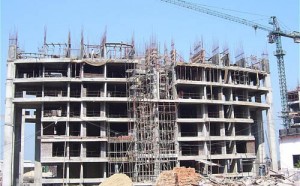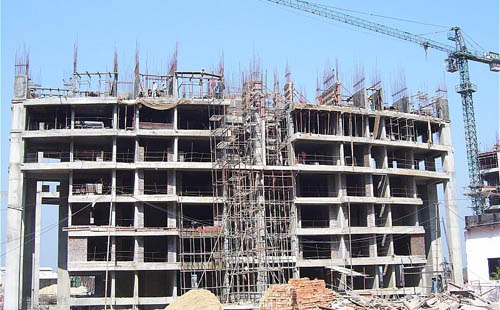News point: There are many reasons of project delays and both the builders as well as government officials are guilty of spoiling the eco-system of housing market.
 When Kanabh Aggrawal shifted from Gurgaon to Mumbai he sold off his property and bought an newly-launched apartment in Mumbai. Five years later, he is yet to get the possession. Fed up with the project delays, a couple of years back he again bought a near completion project on bank loan. The IT professional who had thought that finishing the raised structure of the apartment would not take more than a year’s time is again disappointed. The project is getting delayed every time with an assurance of another six months.
When Kanabh Aggrawal shifted from Gurgaon to Mumbai he sold off his property and bought an newly-launched apartment in Mumbai. Five years later, he is yet to get the possession. Fed up with the project delays, a couple of years back he again bought a near completion project on bank loan. The IT professional who had thought that finishing the raised structure of the apartment would not take more than a year’s time is again disappointed. The project is getting delayed every time with an assurance of another six months.
“It is like a triple whammy to my finances. My money got stuck with the first apartment, I sort of over-leveraged myself with bank loan for the next apartment. Over and above this, I am paying very high rent also,” says Aggrawal.
To say that project delays are single largest cause of conflict between the builders and the homebuyers would be stating the obvious. Project delays are the most imprtant reason for trust deficit with the real estate sector. As per the data available with Track2Realty more than half, close to 55 per cent consumer cases against the developers are borne out of project delays. The situation is all the more problematic in a city like Mumbai where most of the homebuyers are expat professionals who are buying the houuse for the first time.
Quick bytes: Major reasons of project delay
- Delay in approvals and licenses
- Lack of Skilled workforce
- Shortage in raw material supply
- Government reforms lacking
- Deteriorating market sentiments
- Lack of standard guidelines
Sector accepts with defence
Vipul Shah, Managing Director, Parinee Group agrees that the main problem for trust deficit is the delay in delivery of the project, as most of the buyers are salaried employees and they depend on housing loan while buying a property. The delay in delivery puts extra burden on their finance in the form of extra pre-EMI interest and rent which they continue paying. This increases their landed cost for the house. The delay in project also tarnishes the image of the developers and hits their brand value considerably.
“Timely delivery is considered to be the highest contributor for the reputation of a developer. The core trust factor of real estate industry is delivering on time and if that is delayed everything goes haywire. In most of the cases the delay has been because of the delay in receiving approvals. Various approvals from various departments are required for construction of a building, which takes lot of time. Builders have to run from pillar to post to secure all the approvals and start construction. Also, if one approval is stuck at one department, then it has a cascading effect on all the other approvals,” says Shah.
Manju Yagnik, Vice Chairperson, Nahar Group, however, points out that majority of the delays are non-intentional. No developer wants to be in a situation that impacts his growth due to delay in project delivery. But fly-by-night operators cannot be ruled out. Litigation is one major cause of the delay in the project. Other common factor that delays the project are complications in obtaining necessary permissions which is a very lengthy process, abrupt policy changes that are retrospective, shortage in the supply of raw materials and the likes.
“Unlike yesteryears a consumer is well informed and well aware about the developer’s past performance and the details of the project he intends to invest in. A customer is also well informed about the prevailing market scenario and he does his homework well before taking the final decision of buying a home. If there has been consistency in timely delivery of the past projects by a developer, a single project delay does not contribute to trust deficit factor. But a constant delay in delivery of multiple projects erodes the brand name and trust of a developer and in the sector,” says Yagnik.
Both buyers and developers suffer
Harjith.D.Bubber, M.D & C.E.O, Rivali Park nevertheless accepts that the delay in project has been detrimental over a period of time. He maintains that in a real estate sector the buyer invests his lifetime savings in buying a property and when everything of his is at stake, delay in delivery on committed date creates doubts in his mind. He also blames the factors beyond the developers control for the same.
“With lot of changes in government regulations and delay in receiving approvals and other unavoidable issues both buyer and developers are suffering due to which the buyers have become pessimistic with their investment in the projects. Suppose homebuyers take loan for their property which if in case is delayed they still have to bear the bank interest, rentals etc. that is an unaccounted loss for them. This way, they have steadily destroyed trust in the real estate sector,” says Buber.
Sheer Majored Memo, Partner, Zara Habitats says amongst other reasons, endless and indefinite delays in completion and delivery of projects is undoubtedly the most significant factor that harbors trust deficit in the real estate sector specially in a city like Mumbai.
“There are numerous factors that either individually or jointly affect timely delivery or completion of construction projects. Lack or inadequate appropriation of funding for projects, undue and indefinite delays due to pending approvals, permissions and sanctions for projects to move forward, policy paralysis, court litigations, private disputes are some of the most predominant reasons that most often cause delays in construction projects in Mumbai,” says Memo.
Any way out?
Analysts hence suggest that a lot can be done to improve the eco system of project delivery. Old out-dated policies needs to be relooked at and updated as per current market requirements leading towards development. This will take care of abrupt policy changes as and when required and the system will be stream lined.
There should be fast track judicial system to dispose of the litigations that delays the development and delivery of the project. This will create more clarity in the planning of a project and bring in more transparency. It is demanded that the government should introduce single window clearance for granting construction approvals. This will also improve the situation of project delivery to a large extent.
The requirement for obtaining various NOC’s from different Government departments should be done away with and a single authority should be appointed for construction approvals. The Authorities should also implement more digital initiatives to fasten the approval process and increase transparency levels. This will also help in standardization of processes.
A well-conducted and intensive due diligence on part of developers, tenants and other parties involved in a project is a must and thorough legal check should be a serious consideration for all projects. Chalking out a realistic and practical financial feasibility of projects is imperative as often due to uncertain and unforeseen events economics of projects tend to fluctuate, thus developers should be equipped to cope up with such volatility.
Streamlining of permission and approval process is one of the most important factor that could save a lot of time and revenue both for the developers and the authorities as, commitments for completion and delivery of projects would be more realistic, achievable and certain.





